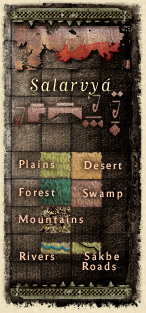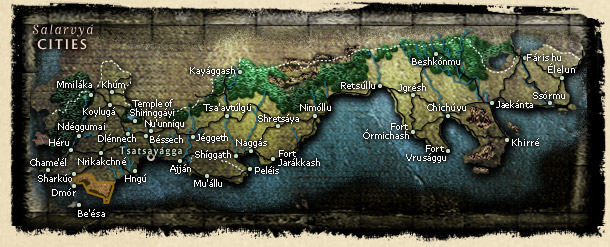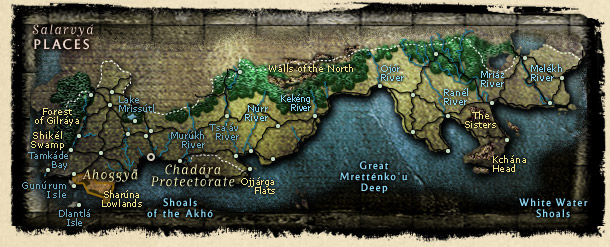 The Lands of Tékumel
The Lands of Tékumel
Salarvyyá
The fifth of the great empires, Salarvyyá, lies along the long southeastern coast.
Seven great feudal dynasties rule Salarvyyá, their land farmed by lesser clans in a complex system of feifs, feudal duties, and reciprocal responsibilities. Each of the seven families holds one or more monopoly: the Chruggilléshmu family of Tsatsayágga has charge of the sea and shipping along the southern coast and also holds the reins of the central government; the Hrüchcháqsha family of Chamé’el has a monopoly upon the Vrélq, the crustacean which produces the black dye used for clothing and dyeing armour; etc.
In theory the Salarvyáni hold to the divine right of kings, but in reality his authority is weak, and real power is held by the Council of Nobles, a body composed of senior members of the Chruggilléshmu family, delgations from the other major lineages, a few clergy, and representatives from other vassal clans. The present monarch, King Griggatsétsa, is quite mad, and his duties have been relegated to his clan-cousin, Prince Zhurrilúgga.

The Salarvyáni are quite distinctive: of the same average height as the Tsolyáni, but with more sallow complexions of almost a pale yellowish tan, and they are generally more hirsute, with heavy body hair, curly or even kinky beards and sickleshaped noses. They tend towards obesity, especially after age 30. The Tsolyáni regard them as feudal hotheads, ‘greasy men with beards like woven rugs’, who have nothing better to do than squabble over trifles.

The Goddess Shiringgáyi dominates all others in Salarvyyá. She is apparently a combination of Avánthe and Dlamélish, and her temples are found all the way from Chame’él out to Mimoré on the eastern ocean. Shrines to Pavár’s other deities are indeed present in every town and city, and there are a few localised divinities as well: eg. Black Qárqa, a particularly repellent form of Sárku venerated by the lords of Tsa’avtúlgu. The priesthoods of Salarvyyá are powerful but perhaps not as all-pervasive and wealthy as those of the other four Empires. Only the Mreshshél-átl family, the hereditary guardian of Shiringgáyi’s sanctuary on the shores of Lake Mrissútl, exhibit a fanaticism equal to that of the inhabitants of the City of Sárku or the Vríddi of Fasíltum.
